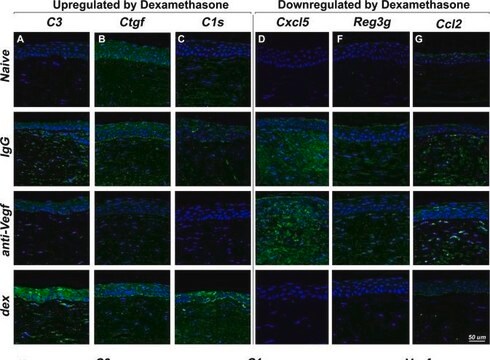05-516
Anti-Ras Antibody, clone RAS10
clone RAS10, Upstate®, from mouse
Synonyme(s) :
GTP- and GDP-binding peptide B, GTPase Hras, Ha-Ras1 proto-oncoprotein, Ras family small GTP binding protein H-Ras, Transforming protein p2, c-has/bas p21 protein, c-ras-Ki-2 activated oncogene, p19 H-RasIDX protein, transformation gene: oncogene HAMSV,
About This Item
Produits recommandés
Source biologique
mouse
Niveau de qualité
Forme d'anticorps
purified immunoglobulin
Type de produit anticorps
primary antibodies
Clone
RAS10, monoclonal
Espèces réactives
rat, human, mouse
Fabricant/nom de marque
Upstate®
Technique(s)
ELISA: suitable
flow cytometry: suitable
immunocytochemistry: suitable
immunohistochemistry: suitable
immunoprecipitation (IP): suitable
western blot: suitable
Isotype
IgG2aκ
Numéro d'accès NCBI
Numéro d'accès UniProt
Conditions d'expédition
dry ice
Modification post-traductionnelle de la cible
unmodified
Informations sur le gène
human ... HRAS(3265) , KRAS(3845) , NRAS(4893)
Description générale
Spécificité
Immunogène
Application
1-4 μg of this antibody has been reported to immunoprecipitate Ras.
Immunocytochemistry:
2.5 μg/mL of this antibody has been reported to show positive immunostaining for Ras in SW480 and Y1 cells.
Immunohistochemistry:
This antibody has been reported to detect Ras in frozen and paraffin embedded breast carcinoma sections.
Qualité
Western Blot Analysis:
0.05 - 0.5 μg/mL of this lot detected Ras in RIPA lysate from human A431 carcinoma cells. A previous lot detected Ras in human HFF, Jurkat, Raji, mouse 3T3, CTLL, rat L-6 and PC- 12 cell lysates.
Description de la cible
Liaison
Forme physique
Remarque sur l'analyse
Positive Antigen Control: Catalog #12-301, non-stimulated A431 cell lysate. Add 2.5µL of 2-mercaptoethanol/100µL of lysate and boil for 5 minutes to reduce the preparation. Load 20µg of reduced lysate per lane for minigels.
Autres remarques
Informations légales
Vous ne trouvez pas le bon produit ?
Essayez notre Outil de sélection de produits.
En option
Code de la classe de stockage
10 - Combustible liquids
Classe de danger pour l'eau (WGK)
WGK 2
Certificats d'analyse (COA)
Recherchez un Certificats d'analyse (COA) en saisissant le numéro de lot du produit. Les numéros de lot figurent sur l'étiquette du produit après les mots "Lot" ou "Batch".
Déjà en possession de ce produit ?
Retrouvez la documentation relative aux produits que vous avez récemment achetés dans la Bibliothèque de documents.
Notre équipe de scientifiques dispose d'une expérience dans tous les secteurs de la recherche, notamment en sciences de la vie, science des matériaux, synthèse chimique, chromatographie, analyse et dans de nombreux autres domaines..
Contacter notre Service technique








